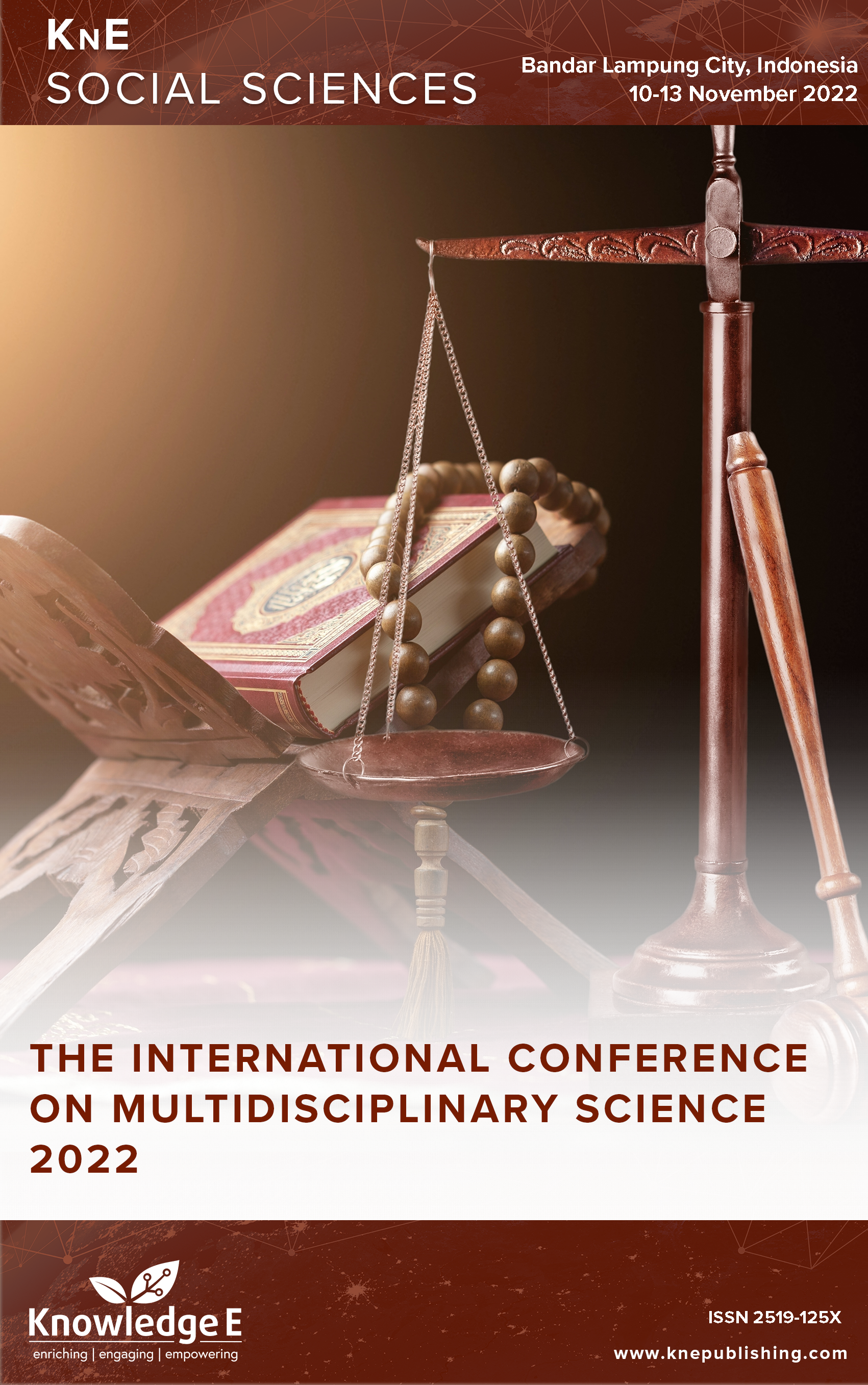Muakhi Culture Strategy in Resolving Multicultural Community Conflicts in Lampung
DOI:
https://doi.org/10.18502/kss.v8i16.14068Abstract
The Transmigration Program creates a multi-cultural Lampung community, which makes it vulnerable to ethnic conflicts. This program has unwittingly formed enclaves between natives and migrants who are not integrated, resulting in polarization and economic gaps, where the immigrant population is more advanced than the natives which causes social jealousy. There are several aspects that trigger conflict, including social jealousy, economic inequality, negative sentiments between groups, inter-ethnic communication impasse and low religious understanding. This study aims to explain and construct Muakhi’s cultural strategy for resolving conflicts in a multicultural society in Lampung. We use qualitative research methods with a phenomenological and constructive approach. The data of this study were obtained through in-depth interviews. These results and discussion that follows are Muakhi local wisdom, which can be a solution in resolving conflicts in a multi-cultural society. In this conflict resolution process, the government invited all conflicted citizens, conflicting traditional leaders and all figures from other ethnicities who were brought together in the Regional Government with the aim of making peace in a brotherly manner or Angkon Muakhi . This study concludes that Muakhi culture can be a solution for resolving conflicts in a multicultural society and a forum for creating peace in accordance with the values and norms that exist in society.
Keywords: Strategy, Culture, Muakhi, Conflict, Society, Multicultural
References
[2] Andriati RD. Transmigration in Doeloe’s Period, Now and Future Hopes.In A Brief History of Transmigration, Central Jakarta. 2015:1-19.
[3] Ariestha B. “The Roots of Inter-ethnic Riot Conflict in South Lampung.” Journal Of Social and Industrial Psychology 1, no. 2 (2012). Budiman. Interview; 2021.
[4] Hartoyo. “Muakhi (Brotherhood) and Its Practices Related to Preventing Communal Conflict in Multicultural Societies.” Society. Cult Politics. 2019;32(3):227–39.
[5] Irham A. Multicultural Political Policy and Efforts to Prevent Social Conflict Smell of Sara, Studying the Waypanji Case of South Lampung. TAPIs 9. 2013;1: 1–15; https://doi.org/https://doi.org/10.24042/tps.v9i1.1571
[6] Ferdian J. Komang. “Register 45 Mesuji Lampung Regional Conflict Resolution Model Based on Community Plantation Forests.”. Politics: Journal of Political Science. 2017;8(1):92.
[7] Juwita R, Firman F, Rusdinal R, Aliman M. Meta Analysis: The Development of Functional Structural Theory in the Sociology of Educators. Journal of Perspective. 2020;3(1):1–8.
[8] Komesaroff PA, Kerridge I, Lipworth W. Conflicts of interest: new thinking, new processes. Intern Med J. 2019 May;49(5):574–7.
[9] Levan P. Let’s Go to the Land of Sabrang: Transmigration in Indonesia. Jakarta: Gramedia Popular Literature; 2003.
[10] Narwoko J. Dwi, and Bagong Suyanto. Introductory and Applied Sociology Text. Jakarta: Prenada Group; 2014.
[11] Nurdin AF. Muakhi Culture and Regional Development from the Perspective of Social Philosophy in Pubian Indigenous Community in Lampung. Alqalam. 2009;26(3):307.
[12] Nurdin A. Fauzie. Muakhi Culture. Yogyakarta: Gama Media; 2009.
[13] Muakhi Culture and Regional Development Towards a Dignified Society. Yogyakarta: Gama Media; 2009.
[14] Islamic Integralism and the Contribution of Muakhi Culture to Community Civilization and the Relevance of the Philosophical Values of Local Culture and Lampung Community Development. Al-Adyan 14.2019;1:35– 50; https://doi.org/https://doi.org/10.24042/ajsla.v14i1.4481
[15] Islamic Integralism and Philosophical Values of Local Culture in the Development of Lampung Province. Unisia. 2009; https://doi.org/10.20885/unisia.vol32.iss71.art6
[16] Nurdin, Bartoven V, NEMUI NYIMAH: Local Wisdom for Building Quality Tolerance, Bamdar Lampung: AURA. 2017;1:81–90.
[17] Rahma MA, Lestari SB. Organizational Conflict Management To Maintain Commitment In Diponegoro University’s 387 Diving Activity Unit. Online Interaction. 2020;8(1):202–32.
[18] Ritz G. Modern Sociological Theory. Depok: Kencana Prenadamedia; 2018.
[19] Rusdiana. Conflict Management. Bandung: Faithful Library; 2019.
[20] Ruslan I. Dimensions of Local Wisdom of the Lampung Community as a Media for Conflict Resolution. Kalam. 2018;12(1):105.
[21] Salim L. Conflict Management Based on Local Wisdom Analysis Theory and Practice. Surabaya: Literature Library; 2022.
[22] Muakhi as a Multicultural Community Conflict Resolution in Lampung. AIRLANGGA UNIVERSITY; 2021.
[23] Salim L, Ruslan I. Muakhi Culture as Ethnic Conflict Management in Lampung. Sociology of Dialectics. 2021;16(2):117– 28; https://doi.org/http://dx.doi.org/10.20473/jsd.v16i2.2021.117- 128 https://doi.org/10.20473/jsd.v16i2.2021.117-128
[24] Singagerda S, Faurani FA, Sari N, Fikri Akbar M. Islamic Integralism and Muakhi Culture: The Relevance of Philosophical Values of Local Culture and Lampung Community Development. International Journal of Disaster Recovery and Business Continuity. 2020;11(3):1880–92.
[25] Susan N. Sociology of Conflict Theories and Analysis. Third. East Jakarta: Prenada Group. 2009.
[26] Vivit Nurdin B, Damayanti D. Land of Hope and Land of the Lost: Study of Power Relations and Local Wisdom Ethnic Lampung, Sumatra, Indonesia. International Journal of Multicultural and Multireligious Understanding. 2018;5(1):27.

